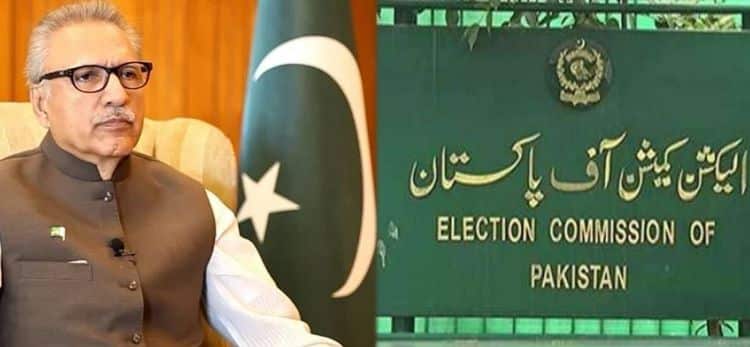In response to a letter from President Dr. Arif Alvi, the Election Commission of Pakistan (ECP) remarked that it expected the president to use more appropriate language while communicating with other constitutional institutions.
The letter expressed disapproval of the president’s language. It noted that “the office of the president is the highest constitutional body and the president is the head of state, while the Constitution requires the Constitution requires all other constitutional and legal bodies to accord the president the utmost respect.”
We have faith in this office’s objectivity and await paternal advice from it toward other constitutional authorities.
In addition, it was noted that the ECP upholds the law and the Constitution and that the president and governors are responsible for determining election dates. At the same time, the electoral watchdog is responsible for overseeing elections.
In this regard, the Election Commission has taken all necessary steps and fully understands its constitutional responsibility to plan and administer the election. It is pertinent to note that Articles 48(5) and 105(3) of the Constitution, respectively, define the roles of the president and the provincial governor.
In the case of dissolution, the Constitution prohibits the electoral watchdog from establishing a date for general elections to a legislature.
In addition, “under Article 105(3)(a), he shall appoint a date for General Elections to the assembly and a care-taker cabinet,” and “under Article 48(5) of the Constitution, if the president dissolves the National Assembly, he shall appoint a date for the election and a care-taker cabinet.”
According to the letter, ECP representatives met with governors after the Lahore High Court (LHC) ordered a meeting to discuss the forthcoming provincial assembly elections. However, instead of announcing a date for the election, the governor stated that he “intends to approach the legal forum.”
The letter was sent shortly after the president informed the chief election commissioner that significant events had transpired since his previous letter to the ECP on February 8, including the LHC order directing the commission to promptly announce the date for elections in Punjab and the recent Supreme Court observations.
He was dissatisfied with the “apathy and passivity” of the electoral watchdog, which had not yet answered his previous letter.
In his letter, the president claimed he had “waited impatiently for the ECP to fulfill its constitutional responsibilities and act accordingly.” Still, he was “very saddened by the electoral watchdog’s insensitive response to this crucial problem.”






